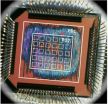(Press-News.org) HOUSTON -- (May 17, 2012) -- Researchers have unveiled an "inexact" computer chip that challenges the industry's dogmatic 50-year pursuit of accuracy. The design improves power and resource efficiency by allowing for occasional errors. Prototypes unveiled this week at the ACM International Conference on Computing Frontiers in Cagliari, Italy, are at least 15 times more efficient than today's technology.
The research, which earned best-paper honors at the conference, was conducted by experts from Rice University in Houston, Singapore's Nanyang Technological University (NTU), Switzerland's Center for Electronics and Microtechnology (CSEM) and the University of California, Berkeley.
"It is exciting to see this technology in a working chip that we can measure and validate for the first time," said project leader Krishna Palem, who also serves as director of the Rice-NTU Institute for Sustainable and Applied Infodynamics (ISAID). "Our work since 2003 showed that significant gains were possible, and I am delighted that these working chips have met and even exceeded our expectations."
ISAID is working in partnership with CSEM to create new technology that will allow next-generation inexact microchips to use a fraction of the electricity of today's microprocessors.
"The paper received the highest peer-review evaluation of all the Computing Frontiers submissions this year," said Paolo Faraboschi, the program co-chair of the ACM Computing Frontiers conference and a distinguished technologist at Hewlett Packard Laboratories. "Research on approximate computation matches the forward-looking charter of Computing Frontiers well, and this work opens the door to interesting energy-efficiency opportunities of using inexact hardware together with traditional processing elements."
The concept is deceptively simple: Slash power use by allowing processing components -- like hardware for adding and multiplying numbers -- to make a few mistakes. By cleverly managing the probability of errors and limiting which calculations produce errors, the designers have found they can simultaneously cut energy demands and dramatically boost performance.
One example of the inexact design approach is "pruning," or trimming away some of the rarely used portions of digital circuits on a microchip. Another innovation, "confined voltage scaling," trades some performance gains by taking advantage of improvements in processing speed to further cut power demands.
In their initial simulated tests in 2011, the researchers showed that pruning some sections of traditionally designed microchips could boost performance in three ways: The pruned chips were twice as fast, used half as much energy and were half the size. In the new study, the team delved deeper and implemented their ideas in the processing elements on a prototype silicon chip.
"In the latest tests, we showed that pruning could cut energy demands 3.5 times with chips that deviated from the correct value by an average of 0.25 percent," said study co-author Avinash Lingamneni, a Rice graduate student. "When we factored in size and speed gains, these chips were 7.5 times more efficient than regular chips. Chips that got wrong answers with a larger deviation of about 8 percent were up to 15 times more efficient."
Project co-investigator Christian Enz, who leads the CSEM arm of the collaboration, said, "Particular types of applications can tolerate quite a bit of error. For example, the human eye has a built-in mechanism for error correction. We used inexact adders to process images and found that relative errors up to 0.54 percent were almost indiscernible, and relative errors as high as 7.5 percent still produced discernible images."
Palem, the Ken and Audrey Kennedy Professor of Computing at Rice, who holds a joint appointment at NTU, said likely initial applications for the pruning technology will be in application-specific processors, such as special-purpose "embedded" microchips like those used in hearing aids, cameras and other electronic devices.
The inexact hardware is also a key component of ISAID's I-slate educational tablet. The low-cost I-slate is designed for Indian classrooms with no electricity and too few teachers. Officials in India's Mahabubnagar District announced plans in March to adopt 50,000 I-slates into middle and high school classrooms over the next three years.
The hardware and graphic content for the I-slate are being developed in tandem. Pruned chips are expected to cut power requirements in half and allow the I-slate to run on solar power from small panels similar to those used on handheld calculators. Palem said the first I-slates and prototype hearing aids to contain pruned chips are expected by 2013.
INFORMATION:
High-resolution images are available for download at:
http://news.rice.edu/wp-content/uploads/2012/05/0515_CHIP_full.jpg
CAPTION: In terms of speed, energy consumption and size, inexact computer chips like this prototype, are about 15 times more efficient than today's microchips.
CREDIT: Avinash Lingamneni/Rice University/CSEM
http://news.rice.edu/wp-content/uploads/2012/05/0516_CHIP_lg.jpg
CAPTION: This comparison shows frames produced with video-processing software on traditional processing elements (left), inexact processing hardware with a relative error of 0.54 percent (middle) and with a relative error of 7.58 percent (right). The inexact chips are smaller, faster and consume less energy. The chip that produced the frame with the most errors (right) is about 15 times more efficient in terms of speed, space and energy than the chip that produced the pristine image (left).
CREDIT: Rice University/CSEM/NTU
http://news.rice.edu/wp-content/uploads/2012/05/0515_CHIP_Palem-lg.jpg
CAPTION: Krishna Palem
CREDIT: Tommy LaVergne/Rice University
Computing experts unveil superefficient 'inexact' chip
Rice University experts challenge computing dogma, win 'best paper' accolades
2012-05-18
ELSE PRESS RELEASES FROM THIS DATE:
Oregon Driver Arrested On Suspicion of Being Drunk Had Kids in the Car
2012-05-18
Samuel Lee Sanders, 37, was arrested in early April on a laundry list of charges. Police in Washington County booked Sanders on suspicion of driving under the influence of intoxicants (DUII), reckless endangering, reckless driving, refusal of a breath test and driving with a suspended license.
Significantly, Sanders had two young children with him in the car at the time of his arrest. If he is unable to stage a successful Oregon drunk driving defense, this could mean substantially increased penalties.
Reckless Endangering Charge Tacked On For DUII With Children in ...
New York Construction Accident Lawyer from The Perecman Firm Reflects on the Dangerous Work Environment for Ironworkers as Union Recruits Apprentices
2012-05-18
Union officials handed out applications for 50 recently-opened ironworkers apprenticeship positions, reported the New York Daily News (5/2/2012).
http://www.nydailynews.com/new-york/queens/hardhat-hopefuls-flood-woodside-chance-apprentice-article-1.1071408#ixzz1tpUyl4HR
All 500 applications were handed out in approximately three hours, union officials told the New York Daily News.
Hundreds of job seekers had camped out in front of Metallic Lathers Local 46 in Woodside, Queens for their chance to apply. The first person in line had arrived a week before the applications ...
Hybrid vaccine demonstrates potential to prevent breast cancer recurrence
2012-05-18
CHICAGO — A breast cancer vaccine already shown to elicit a powerful immune response in women with varying levels of HER2 expression has the ability to improve recurrence rates and is well tolerated in an adjuvant setting, according to new research from a clinical trial led by researchers at The University of Texas MD Anderson Cancer Center.
The findings, released today, will be presented on Monday, June 4 in an oral presentation at the 2012 Annual Meeting of the American Society of Clinical Oncology (ASCO). It builds on previous research showing the vaccine, known as ...
Preventing post-traumatic stress
2012-05-18
A decade after the start of the wars in Afghanistan and Iraq, studies have shown that the incidence of post-traumatic stress disorder (PTSD) among troops is surprisingly low, and a Harvard researcher credits the drop, in part, to new efforts by the Army to prevent PTSD, and to ensure those who do develop the disorder receive the best treatment available.
In an article that appears in the May 18 issue of Science, Professor of Psychology Richard J. McNally says there is reason for cautious optimism when it comes to the prevalence of PTSD. While early estimates suggested ...
Redefining Childhood Presentation at Playcon to Focus on Kids' Play Research
2012-05-18
WHO: Renee Weber is VP, Consumer Strategy and Research at The Marketing Store Worldwide, one of the largest brand activation, loyalty, and youth and family marketing agencies in the world, leads youth research for consumer products, toys and promotional marketing efforts working with major brands.
Renee is an expert in youth and family. At The Marketing Store, her primary responsibilities are to provide more in-depth understanding of youth/families, youth promotions/product development, help lead consumer-based product innovation and establish The Marketing Store Play ...
Ancient giant turtle fossil revealed
2012-05-18
Picture a turtle the size of a Smart car, with a shell large enough to double as a kiddie pool. Paleontologists from North Carolina State University have found just such a specimen – the fossilized remains of a 60-million-year-old South American giant that lived in what is now Colombia.
The turtle in question is Carbonemys cofrinii, which means "coal turtle," and is part of a group of side-necked turtles known as pelomedusoides. The fossil was named Carbonemys because it was discovered in 2005 in a coal mine that was part of northern Colombia's Cerrejon formation. The ...
David Cerami, CKBR Honored With Big50 Award
2012-05-18
David Cerami, CKBR (Certified Kitchen & Bath Remodeler), owner of Hometech Renovations, Inc. & Let's Face It, Inc., has been selected by Remodeling magazine to join the remodeling Big50. The Big50 awards were presented at a gala dinner at the Remodeling Leadership Conference in Baltimore, MD on May 11, 2012. The 2012 Big50 winners are featured in the May issue of remodeling, a national trade publication read by more than 80,000 professional remodeling contractors.
Each year since 1986, the remodeling Big50 inducts 50 owners of remodeling companies that have ...
Teaching creativity to children from a galaxy away
2012-05-18
Playing make-believe is more than a childhood pasttime. According to psychologists, it's also crucial to building creativity, giving a child the ability to consider alternative realities and perspectives. And this type of thinking is essential to future development, aiding interpersonal and problem-solving skills and the ability to invent new theories and concepts. That has been shown to be a component of future professional success in fields from the arts to the sciences and business.
But can creativity be taught? Prof. Nira Liberman ofTel Aviv University's School of ...
Parents are happier than non-parents, new research suggests
2012-05-18
New research by psychologists at three North American universities, including the University of British Columbia, finds that parents experience greater levels of happiness and meaning from life than non-parents.
The findings, which contrast sharply with recent scholarship and popular beliefs, suggest that parents are happier caring for children than they are during other daily activities. The research also suggests that the benefits of parenthood appear more consistently in men and older and married parents.
To be published in the journal Psychological Science, the ...
NIH-led study finds genetic test results do not trigger increased use of health services
2012-05-18
People have increasing opportunities to participate in genetic testing that can indicate their range of risk for developing a disease. Receiving these results does not appreciably drive up or diminish test recipients' demand for potentially costly follow-up health services, according to a study performed by researchers at the National Institutes of Health and colleagues at other institutions.
The study in the May 17, 2012 early online issue of Genetics in Medicine was done by investigators with the Multiplex Initiative, a multi-center collaborative initiative involving ...
LAST 30 PRESS RELEASES:
Transient Pauli blocking for broadband ultrafast optical switching
Political polarization can spur CO2 emissions, stymie climate action
Researchers develop new strategy for improving inverted perovskite solar cells
Yes! The role of YAP and CTGF as potential therapeutic targets for preventing severe liver disease
Pancreatic cancer may begin hiding from the immune system earlier than we thought
Robotic wing inspired by nature delivers leap in underwater stability
A clinical reveals that aniridia causes a progressive loss of corneal sensitivity
Fossil amber reveals the secret lives of Cretaceous ants
Predicting extreme rainfall through novel spatial modeling
The Lancet: First-ever in-utero stem cell therapy for fetal spina bifida repair is safe, study finds
Nanoplastics can interact with Salmonella to affect food safety, study shows
Eric Moore, M.D., elected to Mayo Clinic Board of Trustees
NYU named “research powerhouse” in new analysis
New polymer materials may offer breakthrough solution for hard-to-remove PFAS in water
Biochar can either curb or boost greenhouse gas emissions depending on soil conditions, new study finds
Nanobiochar emerges as a next generation solution for cleaner water, healthier soils, and resilient ecosystems
Study finds more parents saying ‘No’ to vitamin K, putting babies’ brains at risk
Scientists develop new gut health measure that tracks disease
Rice gene discovery could cut fertiliser use while protecting yields
Jumping ‘DNA parasites’ linked to early stages of tumour formation
Ultra-sensitive CAR T cells provide potential strategy to treat solid tumors
Early Neanderthal-Human interbreeding was strongly sex biased
North American bird declines are widespread and accelerating in agricultural hotspots
Researchers recommend strategies for improved genetic privacy legislation
How birds achieve sweet success
More sensitive cell therapy may be a HIT against solid cancers
Scientists map how aging reshapes cells across the entire mammalian body
Hotspots of accelerated bird decline linked to agricultural activity
How ancient attraction shaped the human genome
NJIT faculty named Senior Members of the National Academy of Inventors
[Press-News.org] Computing experts unveil superefficient 'inexact' chipRice University experts challenge computing dogma, win 'best paper' accolades


